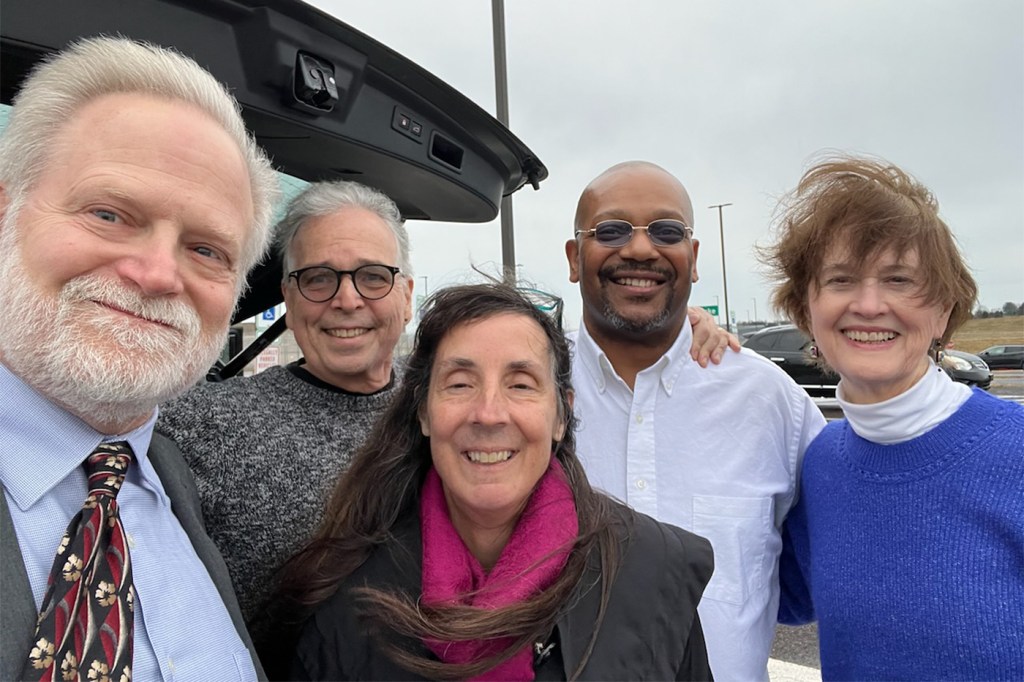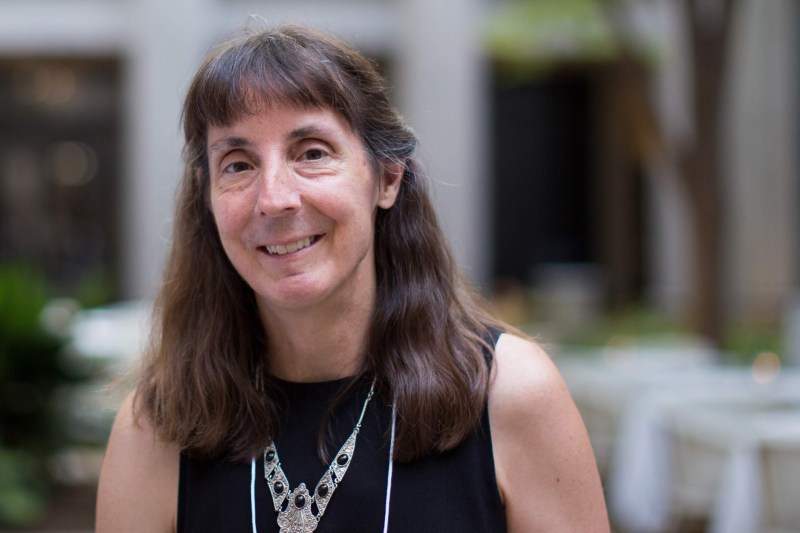Published on
Daniel Gwynn sat on death row for 30 years. Meet the Northeastern law grad who helped set him free
Gretchen Engel, executive director of the Center for Death Penalty Litigation, is a lawyer and advocate for those facing capital punishment.

While on co-op as a student at Northeastern University School of Law in spring 1991, Gretchen Engel drove from Montgomery, Alabama, to meet with a client on the state’s death row — a 90-minute journey that took her through the hometown of “To Kill a Mockingbird” author Harper Lee.
She cried the whole trip back.
“I think I realized the reality of what the death penalty really means — that this human being I met, there are very large forces and institutions that want to put him in the electric chair,” Engel says.
More than 30 years later, a painting from that client hangs on the wall behind Engel’s desk at The Center for Death Penalty Litigation in Durham, North Carolina, inspiring her to fight on behalf of those who face the law’s toughest punishments, including death.
Engel recently won a major battle in that fight.

Courtesy photo
On Feb. 27, a judge approved a motion from the Philadelphia District Attorney’s Office to dismiss first-degree murder, arson and aggravated assault charges against Daniel Gwynn, 54, who had been on death row for nearly 30 years.
“The exoneration of Daniel Gwynn today frees a man who is likely innocent. Sadly, it also exemplifies an era of inexact and, at times, corrupt policing and prosecution that has broken trust with our communities to this day,” District Attorney Larry Krasner said in a press release. “The public expects the right consequences for those who commit violent crimes, and wants the innocent to be free. When law enforcement wrongly arrests, prosecutes, and imprisons the innocent, the guilty go free and are emboldened to do more harm.”
Engel was Gwynn’s co-counsel.
She recalled the moment when she, her co-counsel and fellow supporters of Gwynn greeted the freed man as he walked out of prison.
“You know, some people are good at hugs and other people are sort of OK at it: he’s really good at it,” Engel says of Gwynn.
The Gwynn Case
Gwynn was convicted in 1994 for the death of Marsha Smith in a fatal fire, and he was sentenced to death. But Engel and the DA’s office say Gwynn’s conviction was based on a false and coerced confession that contradicted physical evidence, including how and where the fire started and — Gwynn said — took advantage of his altered mental state while withdrawing from drugs.
The conviction was also based on mistaken eyewitness testimony and prosecutorial misconduct, including the failure to disclose additional evidence suggesting a different suspect, according to the DA’s office. That other suspect was convicted of murder in a separate case and is serving a life sentence, Assistant District Attorney David Napiorski told CBS News Philadelphia.
The exoneration marked the end of nearly a decade of work for Engel, who had signed on to the case in 2015.
She calls the outcome — her first death row exoneration — a “big highlight” of her career.
But it’s a career that Engel didn’t necessarily see coming until Northeastern.
Interest in issues involving race and poverty
Engel says she was always interested in issues of race and poverty and remembered researching the death penalty and reading Albert Camus’ essay, “Reflections on the Guillotine,” as a debate participant in high school in the Midwest.
“Race and poverty were always issues that I thought were the most compelling, and the death penalty brings those issues together in very sharp relief,” Engel says.
But after graduating from Oberlin College, Engel addressed these issues not through the law, but through service work.
Race and poverty were always issues that I thought were the most compelling, and the death penalty brings those issues together in very sharp relief.
Gretchen Engel, a 1992 graduate of the Northeastern School of Law
She worked in Wisconsin with Volunteers in Service to America (VISTA), an anti-poverty program designed to provide resources to nonprofit organizations and public agencies to increase their capacity. VISTA is now a part of AmeriCorps. She then traveled to work for two years in Indonesia.
“I went with very high ideals of what I might be able to do in Indonesia, but I wasn’t an engineer and I wasn’t a doctor, so I wasn’t very useful,” Engel says.
Engel says she nevertheless gained a lot from the experience, including the realization of how important it was to work in one’s own community.
“Really, people in Indonesia need to be empowered and they need to be the ones in charge of making the decisions about how to make their society better,” Engel says. “The place where I need to work is in my own community.”
So, she considered law school.
Northeastern School of Law and co-ops
Engel recalled that Michael Meltsner, Matthews Distinguished University Professor of Law Emeritus at Northeastern, and a prominent civil rights attorney who successfully argued a capital case before the Supreme Court in 1963 at age 26, had visited Oberlin as a graduate and a parent while she was an undergrad.
Engel thought of Northeastern and would later take a seminar with Meltsner.
“She was an excellent student and was interested in the subject even then,” Meltsner recalls. “She has continued to play a critical role in challenging the way North Carolina deals with death penalty issues. She has found ways to direct and support an organization over the long haul that fights against some of the worst aspects of the criminal justice system.”
Engel also “adored” the late Dan Givelber, who was working on a capital case when she was a student.
Her co-op experiences in Georgia and Alabama were also formative in her decision to practice capital cases.
For instance, Engel described her co-op in Montgomery, Alabama, with lawyer and advocate Bryan Stevenson, who later became founder and executive director of the Equal Justice Initiative, as “pivotal” to her career choice.
“Bryan himself and the other staff attorneys there were very committed and smart and kind human beings who are wonderful lawyers that really were mentors and examples of what a lawyer should be,” Engel says.
She followed this with a similar co-op experience at the Southern Center for Human Rights in Georgia.
NGN Magazine, in your inbox.
Sign up to receive thoughtful stories that chronicle innovations and examine inspiring solutions to global problems.
